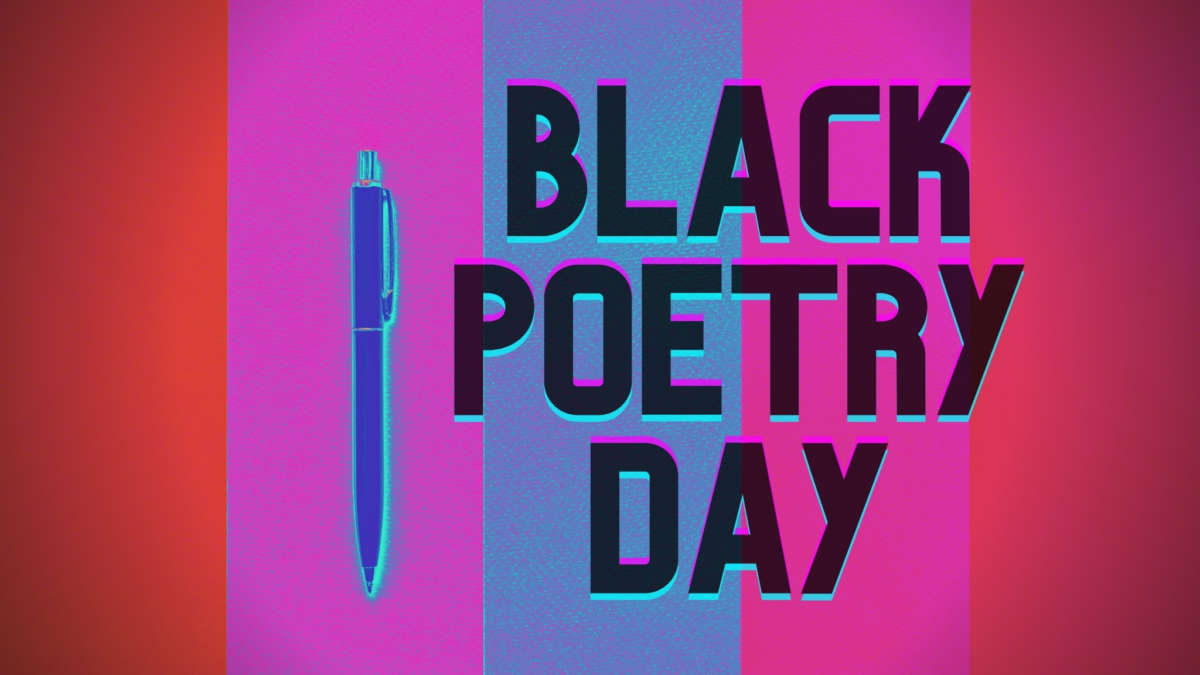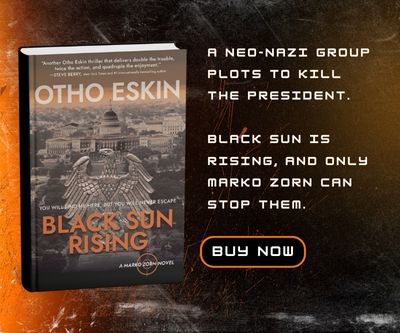Black Poetry Day was established in 1985 to honor Black poets from past to present. Why October 17th you may ask? It’s the birthday of the first Black poet to be published in the United States, Mr. Jupiter Hammon, and the road he paved for those to come. Every year, the celebration gains a little more traction on the national stage, and we’re happy to add fuel to the fire.
A Black folk musician, Stanley A. Ransom, proposed National Black Poetry Day in 1970 to draw attention to the woefully underrepresented achievements of African-American writers. Many wonderful wordsmiths, some mentioned below, have long been an afterthought to their white counterparts. A day set aside annually to recognize and take pride in the talented men and women who have, for so long, been swept under the rug, is a small step but a worthwhile one.
Naturally, poetry is only a tiny piece of the pie. Black artists utilizing any medium, or Black anything for that matter, are finally beginning to see their accomplishments, stories and context brought into the limelight. The New York Times published a thought-provoking and educational article detailing key events in the history of Black Americans that will pique the interest of history buffs, civil-rights activists, lovers of art and just about anyone with a curious mind.
We invite you to broaden that mind of yours by familiarizing yourself with some notable, quotable and also some seldom-talked-about Black poets … today of all days, but maybe a little more consistently too!
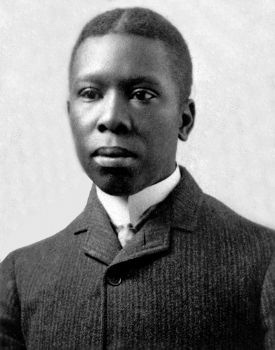
by Jupiter Hammon
This is the aforementioned premier-published African-American poet. Hammond was born into slavery at Henry Lloyd’s estate on Lloyd Neck, Long Island, NY. His full body of work consists of eight publications, four poems and four prose, all religious, but very little else is known about the man whose birthday sealed the date for this yearly commemoration. It is suspected that Hammon learned alongside the estate owner’s own children and read the books available to him in the manor library. He later took on the role of preacher to his fellow slaves and became a well-regarded and respected member of the African-American community.
Poem Excerpt: “An Address to Miss Phillis Wheatley”
Behold! the soul shall waft away,
Whene’er we come to die,
And leave its cottage made of clay,
In twinkling of an eye.
Now glory be to the Most High,
United praises given,
By all on earth, incessantly,
And all the host of heav’n.
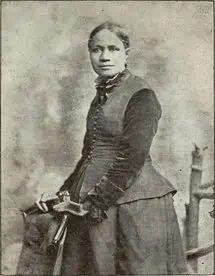
by Frances Ellen Watkins Harper
This incredibly courageous woman merits some recognition: She was the first African-American woman to publish a short story, but she was also an influential abolitionist, suffragist and reformer who co-founded the National Association of Colored Women’s Clubs. Frances was born in Baltimore in freedom. Her parents died when she was very young, sadly, so she was raised by her Aunt and Uncle. The latter’s abolitionist efforts sparked the same fire in his niece, and, since she also strove for her own education, Frances used her pen mightily to champion freedom. Harper completed her first small volume of poetry called “Forest Leaves” at age 21, continued writing, and became a trailblazing teacher in Ohio a few years later. When her home state passed a law prohibiting free blacks to return, Frances devoted the rest of her life to battling slavery. Her poems were part of that noble work.
Poem Excerpt: “The Slave Auction”
The sale began — young girls were there,
Defenseless in their wretchedness,
Whose stifled sobs of deep despair
Revealed their anguish and distress.
And mothers stood, with streaming eyes,
And saw their dearest children sold;
Unheeded rose their bitter cries,
While tyrants bartered them for gold.
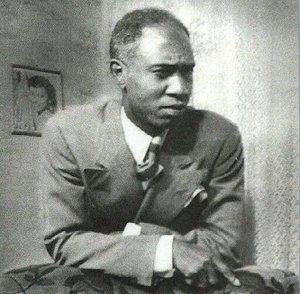
by Melvin B. Tolson
An American poet, educator, columnist and politician, Tolson had a prolific life of the mind. While he was born in Missouri to an enslaved mother and her white master, he eventually married and moved to Texas to pursue teaching and speaking. Tolson was also a poet of high modernism, very much in the vein of T.S. Elliot and Ezra Pound. In 1947, Tolson was elected Poet Laureate of the Republic of Liberia, the country founded by liberated American slaves. Tolson’s Libretto for the Republic of Liberia considers African and American history from the perspective of a future in which Liberia is the hub of a thriving techno-industrial economy. Denzel Washington played the part of Tolson, focusing on his roles as teacher, scholar and civil rights advocate, in the movie The Great Debaters. His poems include “Dark Symphony,” “Harlem Gallery” and “Rendezvous With America.”
Poem Excerpt: “A Song for Myself”
I judge
My soul
Eagle
Nor mole:
A man
Is what
He saves
From rot.
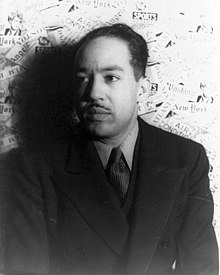
by Langston Hughes
Here’s a Black poet so gifted that his work broke through prejudice and earned him recognition even in his day. James Mercer Langston Hughes was born February 1, 1902, in Joplin, MO. He was a child of divorce and moved frequently throughout his early life, from small midwestern towns to Mexico to a year at Columbia University in NYC, to Washington, DC, and more. Additionally, he worked a wide array of jobs. This diverse worldview doubtless contributed to his writing inspiration, which fueled his creation of novels, plays, short stories and, of course, poems. Hughes’ first book of poetry, The Weary Blues, was published by Alfred A. Knopf in 1926. As he progressed and honed his craft, he remained faithful to his mission to authentically relate the African-American experience. His monumental poem “Montage of a Dream Deferred” is especially notable.
Poem: “Dreams”
Hold fast to dreams
For if dreams die
Life is a broken-winged bird
That cannot fly.
Hold fast to dreams
For when dreams go
Life is a barren field
Frozen with snow.
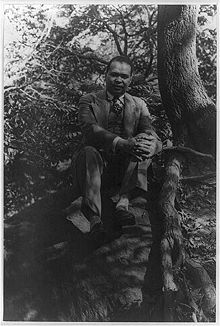
by Countee Cullen
This poet embodies the spirit and energy of the Harlem Renaissance. Raised by the pastor of Salem Methodist Episcopal Church, Harlem’s largest congregation, Countee grew up in the mecca for African-American thinkers, artists and activists while also gradually embracing Christianity. He was a paradox as a civil rights activist, desiring to avoid racially charged art in a quest for a “color-blind” world, but also craving an outlet for his resentment and righteous anger at the treatment of Blacks people by society. He published multiple collections over his relatively brief life including Color; The Medea, and Some Poems; On These I Stand; The Black Christ, and Other Poems. Notable poems include “The Ballad of the Brown Girl,” “Heritage,” “Near White” and “The Love Tree.”
Poem: “A Brown Girl Dead.”
With two white roses on her breasts,
White candles at head and feet,
Dark Madonna of the grave she rests;
Lord Death has found her sweet.
Her mother pawned her wedding ring
To lay her out in white;
She’d be so proud she’d dance and sing
To see herself tonight.
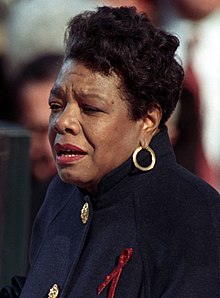
by Maya Angelou
“My mission in life,” Angelou once said, “is not merely to survive, but to thrive, and to do so with some passion, some compassion, some humor, and some style.” But her inspirational life was not all humor and happiness; she was raped by her mother’s boyfriend at a mere 8 years old and, after the trauma, went mute for five years. She eventually, thankfully, found her voice, both literally and metaphorically. Primarily known as an essayist and a poet, Angelou is likely best remembered for her stunning and heart-wrenching autobiography, I Know Why the Caged Bird Sings, and for the recitation of her poem “On the Pulse of the Morning” at the first inauguration of President Bill Clinton (more on inaugurations to come!) At that event, she became the first poet to make an inaugural recitation in three decades. In 2011, she was awarded the Presidential Medal of Freedom by President Barack Obama.
Poem Excerpt: “On the Pulse of Morning”
You, created only a little lower than
The angels, have crouched too long in
The bruising darkness
Have lain too long
Facedown in ignorance,
Your mouths spilling words
Armed for slaughter.
The Rock cries out to us today,
You may stand upon me,
But do not hide your face.
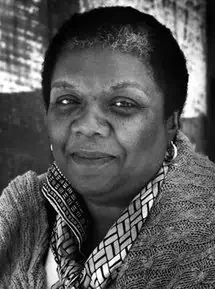
by Lucille Clifton
Discovered by Langston Hugues, who published her poetry in his highly influential anthology, Lucille Clifton’s work speaks volumes on the African-American experience, especially in the wake of trials and adversity. Clifton was the first author to have two books of poetry chosen as finalists for the Pulitzer Prize, and her collection Two-Headed Woman was also a Pulitzer nominee and winner of the Juniper Prize from the University of Massachusetts. She served as the state of Maryland’s poet laureate from 1974 until 1985, won the National Book Award for Blessing the Boats: New and Selected Poems, and earned the Ruth Lilly Poetry prize in 2007. In addition to her numerous poetry collections, she wrote many children’s books, was a Distinguished Professor of Humanities at St. Mary’s College of Maryland and a Chancellor of the Academy of American Poets. Her style was sparse and focused on the essential, but the brevity didn’t reduce depth of meaning.
Poem: “my dream about time”
a woman unlike myself is running
down the long hall of a lifeless house
with too many windows which open on
a world she has no language for,
running and running until she reaches
at last the one and only door
which she pulls open to find each wall
is faced with clocks and as she watches
all of the clocks strike
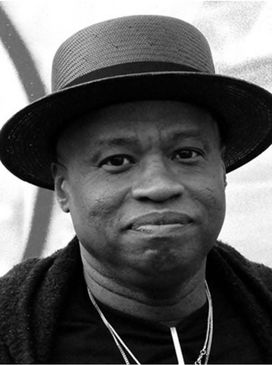
by Randall Horton, Ph.D
Randall Horton is the recipient of the Gwendolyn Brooks Poetry Award, the Bea Gonzalez Poetry Award, the Great Lakes College Association New Writers Award for Creative Nonfiction and a National Endowment of the Arts Fellowship in Literature. In 2018-2019 Dr. Horton was selected as Poet-in-Residence for the Civil Rights Corps in Washington, DC, which is a nonprofit organization dedicated to challenging systemic injustice in the American legal system. Dr. Horton also received a Right to Return Fellowship to creatively address issues of mass incarceration and racial justice while advancing campaigns for change. His latest collection of poetry, {#289-128}: Poems, received the 2021 American Book Award. Dead Weight: A Memoir in Essays will be published by Northwestern University Press in 2022. Dr. Horton is a Professor of English at the University of New Haven. He is a modern, new voice in poetry. Says Ed Pavlić, author of Another Kind of Madness: A Novel, “Dead Weight reveals things to us — things like us — in ways we’ve never seen.”
Poem Excerpt: “after ruin”
“In the pursuit of beauty there is always already a series of invisible vertical bars, the indented metal shadows streaming across your face, reminders of how you border yourself off, reduced to a subjugated human in a cell.”
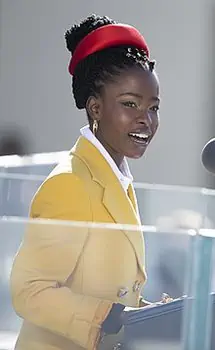
by Amanda Gorman
Meet the 2017 National Poet Laureate, the first in history. Oh, you know her? Of course, she also read her poem “The Hill We Climb” aloud at the inauguration of our current President. After the moment she graced the lives of countless people, this 23-year-old became a household name. She has accomplished so much already, becoming the founder and executive director of One Pen One Page, an organization providing free creative writing programs for underserved youth and has performed at many prominent venues, including the Obama White House, the Library of Congress, Lincoln Center, and on CBS This Morning. When you have an artist whose work can be read at a presidential inauguration and the Super Bowl, you know she’s something special.
Poem Excerpt: “The Hill We Climb”
This is the era of just redemption
we feared at its inception.
We did not feel prepared to be the heirs
of such a terrifying hour
but within it we found the power
to author a new chapter.
To offer hope and laughter to ourselves.
So while once we asked,
how could we possibly prevail over catastrophe?
Now we assert,
How could catastrophe possibly prevail over us?
